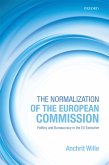Ongoing transformations of the political organization of Europe, where both the nation-state and the European Union are challenged, make it possible to explore phenomena that are difficult to see in stable periods. An upsurge in accountability-demands, where political leaders are required to explain and justify what they are doing, is one such phenomenon. Mainstream approaches to democratic accountability, assuming settled principal-agent relations may give insight into the routines of institutional accountability. This book argues that it is not enough to analyze how accountability processes contribute to routinized maintenance of an established order within relatively stable, simple, and well-known situations. We need to understand accountability in eras of institutional confusion and contestation and in dynamic, complex, and unknown situations. First, variations in the relations between democratic accountability and political association, organization, and agency are endogenous to politics. Second, accountability processes take place within both settled and unsettled orders. They can be both order-maintaining and order-transforming. Third, accountability involves sense-making as well as decision-making. Fourth, accountability may involve mass mobilization or go on largely unnoticed by the public. Fifth, accountability processes may or may not foster new ideas about political order, government, and the role of rank-and-file citizens in political life. They may or may not affect what democracy will mean and imply in the future. The aim of this book is twofold: to contribute to the theorization of democratic accountability and to discuss what accountability processes tell us about political order and orderly change in general.
Dieser Download kann aus rechtlichen Gründen nur mit Rechnungsadresse in A, B, BG, CY, CZ, D, DK, EW, E, FIN, F, GR, HR, H, IRL, I, LT, L, LR, M, NL, PL, P, R, S, SLO, SK ausgeliefert werden.









